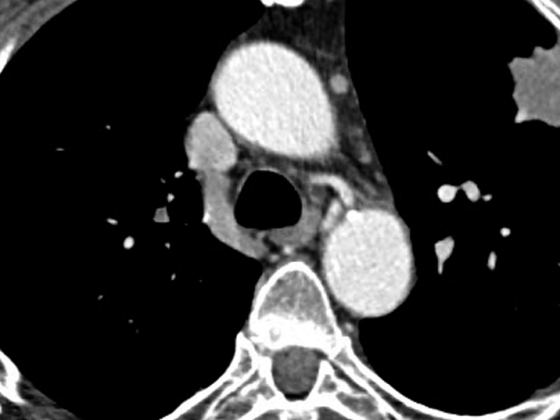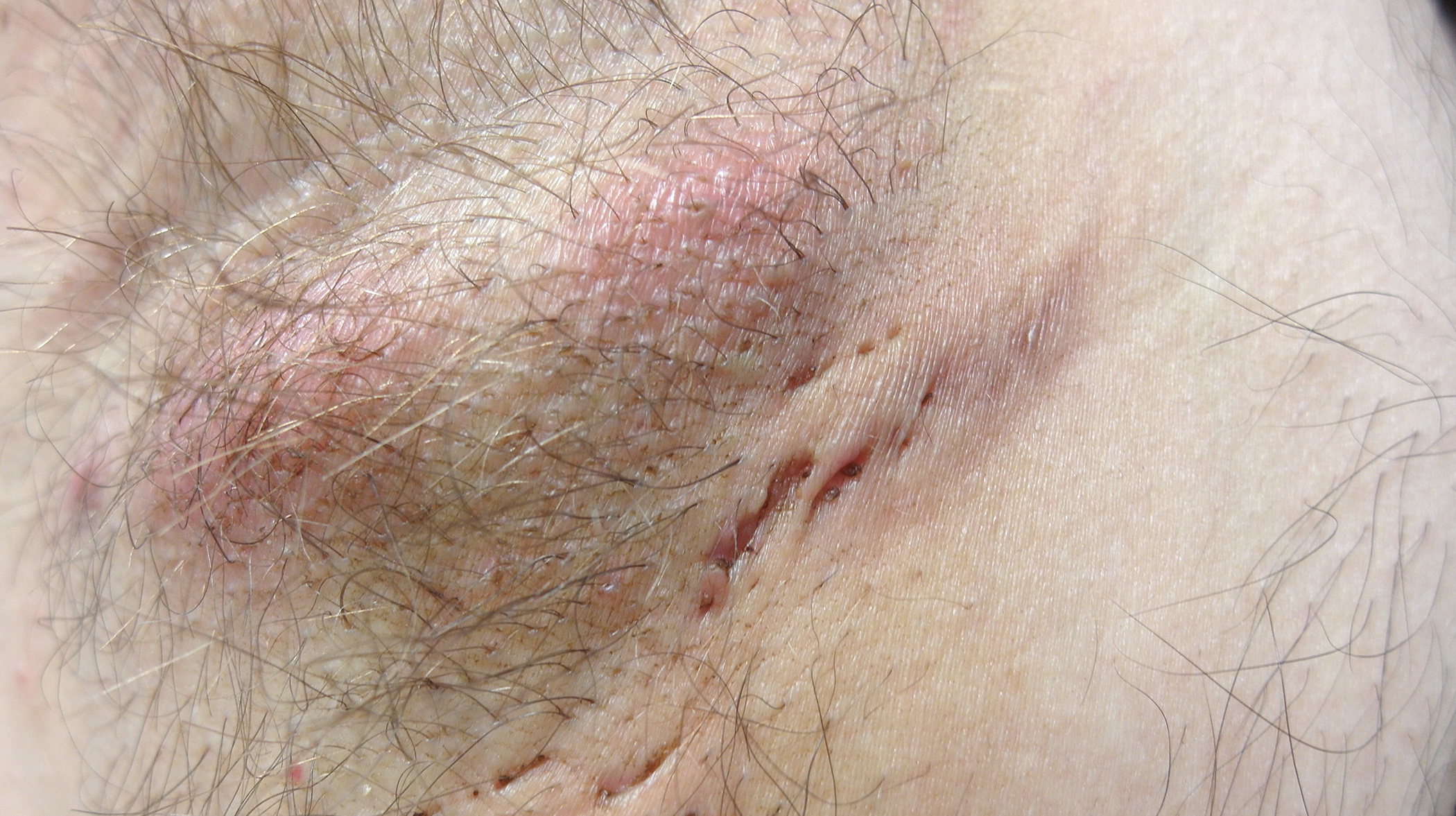A prerequisite for the best possible treatment of memory deficits in AD is a sufficient differential diagnosis. After ruling out other causes, cholinesterase inhibitors and glutamate receptor antagonists can be used to slow the progression of memory deficits. Often, additional neuro-psychiatric symptoms exist, which can affect the patient’s subjective well-being as well as complicate nursing care. In case of comorbidity with other internal or neurological diseases, possible side effects and interactions of the medications must be considered.
Alzheimer’s disease (AD) is an irreversible neurodegenerative disease of the brain and the most common cause of dementia in people over 65 years of age [1,2]. As AD progresses, memory and various other cognitive abilities gradually become impaired; eventually, the affected patient is no longer able to perform the simplest everyday tasks and is in need of care. Cognitive deficits relate specifically to short-term memory, planning and problem-solving skills, analytical and judgment skills, spatial orientation, and language production and comprehension [3,4]. In addition to memory deficits, several neuro-psychiatric complaints are characteristic of AD, which can occur at very early stages of the disease [5,6].
The neuropathological correlate for AD is extracellular amyloid-beta (Aβ) plaques and intracellular tau neurofibrils [7,4]. Modern imaging technologies such as magnetic resonance imaging (MRI) or positron emission tomography (PET) can be used to visualize brain changes in affected patients as the disease progresses [8,9]. Current research suggests that initial brain changes occur more than ten years before the manifestation of clinical Alzheimer’s symptoms. In this preclinical phase, toxic changes take place in brain tissue and Aβ-plaques and neurofibrils become measurable [10]. Although affected patients still show normal memory performance at this time, functional MRI can detect altered neuronal interaction patterns and activity [11,12]. As the disease progresses, neuronal cells die, atrophies of hippocampus and parieto-temporal brain areas are characteristic features of early stages of the disease [13]. The further course of the disease is characterized by spreading of the damage as well as corresponding neuro-psychiatric symptoms [4].
Although research has produced impressive results on the neurobiological basis and also on the diagnosis of AD in the last decades, AD is not curable to date [14]. The aim of currently available medical treatment is therefore to optimally manage the various complaints during the course of the disease in order to achieve the best possible quality of life for affected patients and their relatives. Treatment is based on an interdisciplinary differential diagnosis to rule out other forms of dementia and identify possible treatable causes of memory deficits. In this context, with an increased incidence of other internal and neurological diseases due to older age, the often extensive list of prescribed medications must be kept in mind with regard to possible cognition-impairing side effects and interactions. As part of the differential diagnostic process as well as the assessment of disease progression, quantitative assessment of memory performance using neuropsychological testing procedures is essential [3,15].
Therapeutic approach and medication for AD
Due to the complexity of AD, a multidisciplinary treatment approach is recommended by Swiss and international professional societies [6,15,16]. The individual treatment concept is tailored to the patient’s situation and includes both drug and neuro-psychological interventions, social and psychotherapeutic procedures, and support for family caregivers.
Goal of drug intervention: The treatment should help the patient to maintain memory abilities as long as possible and to cope with behavioral problems.It should generally slow down and postpone the onset of disease symptoms. The severity of dementia in AD – and in this context the indication for AD medication – can be assessed with cognitive screening tests, an established method being the Mini-Mental State Examination (MMSE) test [17]. The MMSE may be repeated at six-month intervals to assess dementia progression and response to treatment.
At present, four agents are approved for the drug treatment of AD: Donepezil (Aricept®), galantamine (Reminyl®) and rivastigmine (Exelon®) can be used for the treatment of mild to moderate dementia in AD, and memantine (Axura®, Ebixa®) can be used for the treatment of moderate to severe AD dementia (MMSE test score of 3-19) [18].
Clinical studies have shown that these agents can improve thinking processes in general, as well as memory and language skills in patients with AD [19,20]. Based on currently available clinical trials of vitamin E and selegiline, there is no evidence for the efficacy of antioxidant treatment approaches in AD [21]. Two clinical trials also failed to show a significant treatment effect for Ginkgo Biloba in AD [22,23].
Donepezil, galantamine, and rivastigmine are centrally acting reversible inhibitors of acetylcholinesterase. They increase both the concentration and duration of action of the neurotransmitter acetylcholine. For optimal efficacy with side effects that are as well tolerated as possible, cholinesterase inhibitors must be titrated up gradually over several weeks until a clinically relevant effect can be expected. Adverse effects of cholinesterase inhibitors are particularly due to peripheral activation of the parasympathetic nervous system with bradycardia, bronchoconstriction, and increased secretion of gastric acid[18].
Memantine acts as a noncompetitive antagonist of the N-methyl-D-aspartate (NMDA) receptor on the glutamatergic neurotransmitter system, but also has serotonergic, cholinergic, and, as a D2 receptor agonist, dopaminergic activity. The efficacy of memantine in AD is explained by an avoidance of glutamate-associated deleterious effects on cerebral neurons. In the context of memantine treatment, effects on cognition, daily living skills, and general level of functioning can be expected after about six months [19]. The individual active dose is titrated up in small increments over several weeks. More common adverse effects of memantine include dizziness, headache, constipation, drowsiness, and increased blood pressure [18].
Synergistic effects have been described for the concomitant medication of memantine with donepezil, as well as increased efficacy compared with donepezil monotherapy in moderate to severe AD [24,25].
Unfortunately, donepezil, galantamine, rivastigmine, and memantine have no effect on the underlying disease process. In addition, they do not work for all affected patients and may only help for a limited period of time. We did not find any study (literature search February 2014) that directly compared the four approved medications in terms of efficacy or side effect profile. With regard to improvement of activities of daily living (ADL), it can be assumed on the basis of the studies that there is no significant difference between the various cholinesterase inhibitors [26]. However, there is evidence that in the absence of a therapeutic response, switching to another drug may be appropriate [27].
Neuropsychiatric symptoms
Neuropsychiatric symptoms present a particular challenge in the treatment of AD [5]. These include, in particular, sleep disturbances, agitation, wandering, anxiety, aggressiveness, apathy, and depression. Adequate treatment increases the well-being of affected patients and facilitates care by relatives or caregivers. In this context, we would like to refer to a recently published review of established treatment concepts for behavioral and psychological symptoms in dementia [6]. Agents for the treatment of neuropsychiatric symptoms in AD should have low anti-cholinergic efficacy as well as be readily combinable with primary AD medication. Proven antidepressant agents in this sense are selective serotonin reuptake inhibitors such as citalopram (various generics), escitalopram (Cipralex®), mirtazapine (e.g., Remeron®), and sertraline (e.g., Zoloft®). Anticonvulsants can be used to treat aggression. Particularly proven to be effective here are: Valproate (e.g. Depakine®), carbamazepine (e.g. Tegretol®) and oxcarbazepine (e.g. Trileptal®).
After precise indication assessment, antipsychotics can also be used for the treatment of acute psychosis or aggressiveness, but the poorer tolerability in elderly patients as well as possible pharmacodynamic interactions, especially with concomitant medication with memantine, must be taken into account [28,29].
Equally careful consideration must be given to the use of benzodiazepines with regard to increased incidence of side effects such as unsteadiness of stance and gait and tendency to fall, so that only short-term use is recommended.
Because of the advanced age of patients with AD, there is often comorbidity with other neurologic and internal diseases. In order to provide the best possible care, a joint, interdisciplinary treatment concept should be pursued by the physicians and therapists involved. This applies in particular to diseases such as asthma and COPD, gastritis, and kinetosis, in which alternatives to anticholinergic drugs must be considered in order to avoid side effects or interactions with a negative effect on the patient’s cognitive performance [16].
When treated with memantine, possible pharmacodynamic interactions in the dopaminergic system must be taken into account; this applies in particular to treatment in comorbidity with hypokinetic movement disorders. A contraindication to memantine is concomitant medication with other NMDA receptor antagonists, such as amantadine (e.g., PK-Merz®) or the antitussive dextromethorphan (Bexin®, Bexomed®, Bisolvon®, Calmerphan®, Calmesin®, Dextro-Med®, Emedrin®, Pretuval®, Pulmofor®).
Future outlook: Clinical trials and preventive treatment concept
In current clinical research projects, a variety of compounds are being tested to see if they can prevent AD, slow disease progression, or at least improve symptoms of AD. The National Institute of Aging (NIA) website features recent clinical trials of therapeutic intervention for AD [30]. A major focus of AD therapy research is based on various approaches to prevent cerebral Aβ deposition or promote cerebral Aβ clearance [31]. Currently, there are clinical trials on Aβ synthesis inhibitors, but also on immunological antibody-based methods against Aβ [32,33].
Current research suggests that effective Aβ-targeted therapy should begin at a very early stage of disease, ideally before manifestation of major irreversible neuronal damage as well as before the appearance of any resulting clinical symptomatology. In this context, it is particularly important to improve diagnostic methods to reliably identify individuals at increased risk for AD at the preclinical disease stage [10]. It may also be possible to achieve a therapeutic effect in AD via reduction of tau neurofibrils, but to our knowledge there are no active clinical trials in this area yet [34]. An alternative research approach is to investigate established agents for potential efficacy in AD (“drug repositioning”) [35].
Paul G. Unschuld, MD
Literature:
- Hock C, Nitsch RM: [Alzheimer dementia]. Praxis (Bern 1994) 2000; 89: 529-540.
- Wilmo A, Prince M: “World Alzheimer Report 2010: The global economic impact of dementia.”, in Alzheimer’s Disease International 2010. (Illinois, USA).
- Albert MS, et al: The diagnosis of mild cognitive impairment due to Alzheimer’s disease: recommendations from the National Institute on Aging-Alzheimer’s Association workgroups on diagnostic guidelines for Alzheimer’s disease. Alzheimer’s & dementia: the journal of the Alzheimer’s Association 2011; 7: 270-279.
- Ballard, C., et al: Alzheimer’s disease. Lancet 2011; 377: 1019-1031.
- Lyketsos CG, et al: Neuropsychiatric symptoms in Alzheimer’s disease. Alzheimers Dement 2011; 7: 532-539.
- Savaskan E, et al: Recommendations for the diagnosis and treatment of behavioral and psychological symptoms of dementia (BPSD). Praxis (Bern 1994) 2014; 103: 135-148.
- Alzheimer, A: On a peculiar disease of the cerebral cortex. General Journal of Psychiatry and Psychiatric-Judicial Medicine 1907; 64: 146-148.
- Klunk WE, et al: Imaging brain amyloid in Alzheimer’s disease with Pittsburgh Compound-B. Annals of neurology 2004; 55: 306-319.
- Frisoni GB, et al: The clinical use of structural MRI in Alzheimer disease. Nat Rev Neurol 2010; 6: 67-77.
- Sperling RA, et al: Toward defining the preclinical stages of Alzheimer’s disease: recommendations from the National Institute on Aging-Alzheimer’s Association workgroups on diagnostic guidelines for Alzheimer’s disease. Alzheimer’s & dementia : the journal of the Alzheimer’s Association 2011; 7: 280-292.
- Sheline YI, et al: Amyloid plaques disrupt resting state default mode network connectivity in cognitively normal elderly. Biol Psychiatry 2010; 67: 584-587.
- Steininger S, et al: Cortical amyloid beta in cognitively normal elderly adults is associated with decreased network efficiency within the cerebro-cerebellar system. Frontiers in Aging Neuroscience 2014; 6: 52, published online 18 March 2014.
- De Leon MJ, Klunk W: Biomarkers for the early diagnosis of Alzheimer’s disease. Lancet Neurol 2006; 5: 198-199.
- Haas C: Strategies, development, and pitfalls of therapeutic options for Alzheimer’s disease. J Alzheimers Dis 2012; 28: 241-281.
- Monsch AU, et al: [Consensus 2012 – diagnosis and treatment of patients with dementia in Switzerland]. Praxis (Bern 1994) 2012; 101: 1239-1249.
- National Institute of Aging (NIA): www.nia.nih.gov/alzheimers/topics/treatment.
- Folstein MF, Folstein SE, Mchugh PR: “Mini-mental state.” A practical method for grading the cognitive state of patients for the clinician. J Psychiatr Res 1975; 12: 189-198.
- Compendium: compendium.ch
- Reisberg B, et al: Memantine in moderate-to-severe Alzheimer’s disease. N Engl J Med 2003; 348: 1333-1341.
- Robbins TW, Roberts AC: Differential regulation of fronto-executive function by the monoamines and acetylcholine. Cereb Cortex 2007; 17 Suppl 1: i151-160.
- Sano M, et al: A controlled trial of selegiline, alpha-tocopherol, or both as treatment for Alzheimer’s disease. The Alzheimer’s Disease Cooperative Study. N Engl J Med 1997; 336: 1216-1222.
- Solomon PR, et al: Ginkgo for memory enhancement: a randomized controlled trial. JAMA 2002; 288: 835-840.
- Schneider LS, et al: A randomized, double-blind, placebo-controlled trial of two doses of Ginkgo biloba extract in dementia of the Alzheimer’s type. Curr Alzheimer Res 2005; 2: 541-551.
- Tariot PN, et al: Memantine treatment in patients with moderate to severe Alzheimer disease already receiving donepezil: a randomized controlled trial. JAMA 2004; 291: 317-324.
- Gauthier S, Molinuevo JL: Benefits of combined cholinesterase inhibitor and memantine treatment in moderate-severe Alzheimer’s disease. Alzheimers Dement 2013; 9: 326-331.
- Wilcock G, et al: A long-term comparison of galantamine and donepezil in the treatment of Alzheimer’s disease. Drugs Aging 2003; 20: 777-789.
- Auriacombe S, et al: Efficacy and safety of rivastigmine in patients with Alzheimer’s disease who failed to benefit from treatment with donepezil. Curr Med Res Opin 2002; 18: 129-138.
- Alexopoulos GS, et al: Using antipsychotic agents in older patients. J Clin Psychiatry 2004; 65 Suppl 2: 5-99; discussion 100-102; quiz 103-104.
- Lustenberger I, et al: Psychotropic medication use in Swiss nursing homes. Swiss Med Wkly 2011; 141: w13254.
- National Institute of Aging (NIA): www.nia.nih.gov/alzheimers/publication/2011-2012-alzheimers-disease-progress-report/ongoing-nia-funded-clinical
- Karran E, Hardy J: Antiamyloid therapy for Alzheimer’s disease–are we on the right road? N Engl J Med 2014; 370: 377-378.
- Nitsch RM, Hock C: Targeting beta-amyloid pathology in Alzheimer’s disease with Abeta immunotherapy. Neurotherapeutics 2008; 5: 415-420.
- Winblad, B., et al: Active immunotherapy options for Alzheimer’s disease. Alzheimers Res Ther 2014; 6, 7.
- Giacobini E, Gold G: Alzheimer disease therapy–moving from amyloid-beta to tau. Nat Rev Neurol 2013; 9: 677-686.
- Corbett A, et al: Drug repositioning for Alzheimer’s disease. Nat Rev Drug Discov 2012; 11: 833-846.
InFo NEUROLOGY & PSYCHIATRY 2014; 12(3): 14-16.











